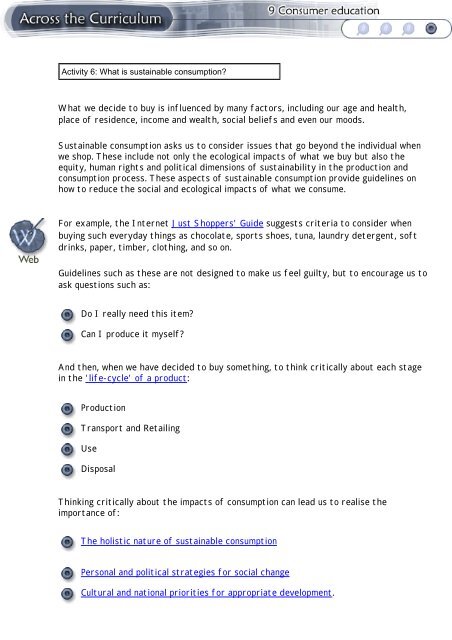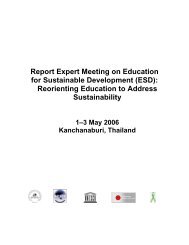Module 9 Consumer education - APCEIU
Module 9 Consumer education - APCEIU
Module 9 Consumer education - APCEIU
Create successful ePaper yourself
Turn your PDF publications into a flip-book with our unique Google optimized e-Paper software.
What we decide to buy is influenced by many factors, including our age and health,<br />
place of residence, income and wealth, social beliefs and even our moods.<br />
Sustainable consumption asks us to consider issues that go beyond the individual when<br />
we shop. These include not only the ecological impacts of what we buy but also the<br />
equity, human rights and political dimensions of sustainability in the production and<br />
consumption process. These aspects of sustainable consumption provide guidelines on<br />
how to reduce the social and ecological impacts of what we consume.<br />
For example, the Internet Just Shoppers' Guide suggests criteria to consider when<br />
buying such everyday things as chocolate, sports shoes, tuna, laundry detergent, soft<br />
drinks, paper, timber, clothing, and so on.<br />
Guidelines such as these are not designed to make us feel guilty, but to encourage us to<br />
ask questions such as:<br />
Do I really need this item<br />
Can I produce it myself<br />
And then, when we have decided to buy something, to think critically about each stage<br />
in the 'life-cycle' of a product:<br />
Production<br />
Transport and Retailing<br />
Use<br />
Disposal<br />
Thinking critically about the impacts of consumption can lead us to realise the<br />
importance of:<br />
The holistic nature of sustainable consumption<br />
Personal and political strategies for social change<br />
Cultural and national priorities for appropriate development.








